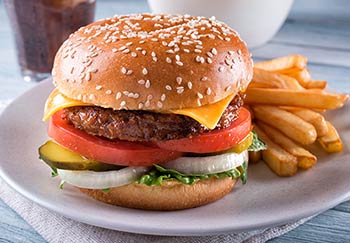
Plant-based meat products were one of the top new trending food items of 2019, and the trend seems to be continuing into 2020. Big brands, fast food chains and restaurants have all been racing to release various plant-based foods, from burgers to “chicken” nuggets.
When you hear the word “plant-based,” you might assume it describes a healthier option than real meat. But is eating plant-based burgers instead of the real thing really good for you? We talked with registered dietician Katherine Basbaum to get some answers.
What’s in Plant-Based Meat?
“My understanding is that all of these products are plant-based, but they’ve got a lot of additives. Most of them seem to be pretty highly processed,” says Basbaum. Which is why the ingredients listed on certain plant-based products would be unrecognizable to most people.
In terms of protein, since vegetables and legumes make up the primary ingredients of these products, they contain the same amount of protein as real meat. The meatless versions also contain synthetic proteins or heme to give a meat-like texture and flavor.
Are Plant-Based Burgers Healthy?
According to Basbaum, “Plant-based burgers have no cholesterol, which regular beef burgers do. However, the plant-based versions tend to have more saturated fat and sodium, plus they are highly processed compared to a regular beef patty.”
Basbaum hesitates to say these meatless options are actually healthier. She notes, as an example of her caution, that at least one major brand makes their products with a significant amount of coconut oil, which has no evidence of being healthy and may actually be detrimental to our health.
Pros for Vegetarians & the Environment
Unlike typical veggie burgers, plant-based meats taste like meat – a great option if you’re a vegetarian or vegan who likes that flavor. Just be careful: Some restaurants use the same grill for meat and meatless burgers. You’ll want to ask about that to keep your diet meat-free.
Need Help with Healthy Eating?
Schedule an appointment with a registered dietitian at our Nutritional Counseling Center.
Plant-based meats definitely do less damage to the environment than beef cattle farms. They have a reduced carbon footprint, require less land use and produce less waste.
The Healthiest Burger Option
Turkey burgers or lean beef burgers are probably a healthier option in most cases, advises Basbaum. You get the protein and nutrition of real meat without the processed ingredients, high sodium, and high saturated fat of the plant-based options.
“The plant-based meats aren’t necessarily bad for you, but I don’t feel like they can be marketed as healthier than a lean beef or turkey burger.” Look for ground turkey breast instead of just ground turkey, which may contain dark meat, making it less healthy.
At the end of the day, you should treat plant-based burgers like you do most foods. Eat them occasionally, just practice moderation.
For more, watch this segment from Straight Talk MD with Dr. Brandy Patterson.
Hi, welcome to Straight Talk MD. I’m Dr. Brandy P. You may be familiar with the old adage, if it sounds too good to be true, it probably is. This came to mind upon reading a recent article about plant-based hamburgers.
They’re appearing more and more on menus these days under the names Impossible Burger or Beyond Burger. Although these burgers are plant based, they’re not your typical veggie burger. In fact, these burgers are advertised to appeal to carnivores, those people who crave the taste of meat, who enjoy that beefy texture and tinge of red peeking out from under the bun. If that sounds like you, then Impossible or Beyond Burgers may be worth trying.
But before you make these meat substitutes part of your diet, it’s very important to consider the pros and the cons. First, these products are plant based, but they are also highly processed and have a lot of additives to enhance their beefy flavor. There is no evidence that genetically-modified foods are bad for us. But if you prefer to stick with whole foods or ingredients you can actually pronounce, you’re better off choosing real lean beef.
Pseudo beef has comparable protein and less cholesterol than the real thing. But these plant-based burgers do have more salt and saturated fat. So there’s no indication that they’re actually better for you. A turkey burger or true veggie burger is a healthier option as long as you steer clear of the mayo and the nacho cheese, of course.
One of the key selling points of these meat-free products is their positive impact on the environment. This may be the primary reason to swap out your regular burger. Cattle farming has a significant carbon footprint. So limiting beef consumption could have a positive impact on the climate.
The bottom line is that there’s no harm in choosing a pseudo burger over a real beef burger, but if you’re making the swap for health reasons, then these may not be your best option. As with all foods, but especially our guilty pleasures, moderation is key. Thank you so much for watching this segment of Straight Talk MD.


Please provide information rather than critiques — Your patients when informed can make decisions about WHICH plant-based alternatives are good choices.
Your “blanket” question — Are “THEY” healthy sounds like an all or nothing — either good or bad and nothing in between. Absolutes are rarely effective when helping clients/patients make healthy choices. Check out abundantly available sites that clearly lay out what’s good and what’s not good in a range of plant-based burger choices.
+1 To Marsha’s comment. This seems exactly like the type of vague article one could point to to try to substantiate views that are not specifically backed up. This reads less like a blog on uvahealth, and more like a long response on Quora.